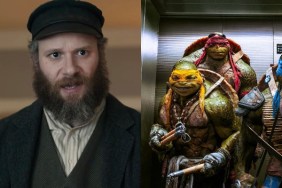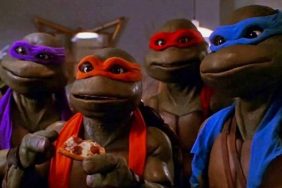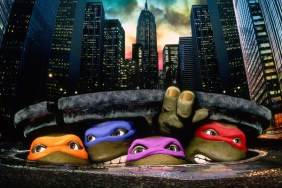I had gotten so used to watching my childhood icons get dragged kicking and screaming into the 21st century that I had almost forgotten what it was like to enjoy them in the first place. Captain America is a Nazi now, apparently. Batman mutilates criminals so they’ll get murdered in prison, when he’s not straight-up murdering them himself. Everywhere you look it seems as though your inner child is getting a harsh and unwanted dose of contemporary cynicism.
Look, I can handle these developments. Whether we like to admit it to ourselves or not, we all can. Our most beloved stories and characters can’t withstand the test of time unless they are actually tested through regular reinterpretation. Change is healthy. It either exposes us to new and better ways to tell the same tales, or it reminds us why the old ways were so damned good in the first place.
Which brings me to my point: after years of the Teenage Mutant Ninja Turtles movies actively trying NOT to adapt the events and characters of the classic cartoon series, we now have Teenage Mutant Ninja Turtles: Out of the Shadows, a film that is more or less exactly what I always wanted. It’s big, it’s crazy, it has a lot of heart, and it kicks a lot of butt.

Paramount Pictures
Make no mistake, Teenage Mutant Ninja Turtles: Out of the Shadows panders to the nostalgia freak in all of us, incorporating popular characters like Casey Jones, Bebop, Rocksteady and Krang the Conquerer and even sneaking in a couple of Vanilla Ice references just for giggles. Most of these characters come across the way we remember them, but if this was just a point-and-click movie (“Hey look, it’s [blank]!”) it would be a soulless enterprise, unworthy of praise.
Instead, director Dave Green (Earth to Echo) keeps the story centered around the Turtles themselves. When we catch up with them at the beginning of the movie they have recently saved New York and received none of the credit. They long to be a part of the city they so diligently protect, and they are starting to resent their monstrous appearances for preventing them from having a “normal” life.
Despite the absolute insanity of their very existence, the Teenage Mutant Ninja Turtles have won the affection of multiple generations of fans, and it’s because on some level we are able see a piece of ourselves in them. It’s because their interactions are, at their best, rather genuine, and similar to the childish relationships we have all had with our siblings and/or peers. Dave Green keeps that dynamic at the forefront of his sequel, so that even when the stupidest possible thing is happening, you still give a damn who it’s happening to.

Paramount Pictures
The plot is dumb and the movie knows it. Shredder escapes from police custody and accidentally winds up meeting an extra-dimensional despot called Krang. (It’s a sequence that is easily the dumbest in the film, since Shredder leaves Earth and confronts a brain with a face on it that lives inside of a giant android, and he has no follow-up questions.) Krang enlists Shredder to repair a teleportation device on Earth, so that they can open a portal that will bring Krang’s all-powerful “Technodrome” into New York City, so they can then conquer the planet.
Like I said, pretty dumb. Fortunately the film never lingers on the mechanics of all this nonsense and instead uses the broad strokes of the plot to put our heroes in exciting situations and leave them plenty of room to bicker. There’s a sequence involving a free-fall from one airplane to another that’s actually kind of breathtaking, and a climactic battle with Krang that is basically all of your action figure fantasies come to life.

Paramount Pictures
It does have problems. Stephen Amell just doesn’t have much to work with as the vigilante Casey Jones, so he doesn’t make nearly as much of an impression as Elias Koteas did in the first movie. Krang’s voice is also frustratingly generic compared to all of the earlier, weirder interpretations, especially considering just how much effort went into making the rest of this movie play like the old show. But worst of all, Shredder still just isn’t a very interesting villain in this version of the franchise. He’s just some bad guy who wants bad things right now. Fortunately, Tyler Perry steals a lot of his scenes as the mad scientist Baxter Stockman, although his subplot doesn’t go nearly as far as you’re expecting it to.
Teenage Mutant Ninja Turtles: Out of the Shadows doesn’t overcome its Saturday morning contrivances. It doesn’t improve upon the plot of the original animated series, nor does it have the realistic and substantive quality of the first live-action film. Instead, Dave Green’s film recreates a sense of childlike wonder that is simply intoxicating. It’s like this movie has a strange kind of power… a “turtle power” if you will… that annihilates all of the cynicism in its path.
Thank goodness for that.
William Bibbiani (everyone calls him ‘Bibbs’) is Crave’s film content editor and critic. You can hear him every week on The B-Movies Podcast and Canceled Too Soon, and watch him on the weekly YouTube series Most Craved, Rapid Reviews and What the Flick. Follow his rantings on Twitter at @WilliamBibbiani.
The 40 Best Non-DC, Non-Marvel Superhero Movies:
Top Photo: Paramount Pictures
The OTHER Best Superhero Movies Ever Made
-
40. Teenage Mutant Ninja Turtles II: The Secret of the Ooze

The second Ninja Turtles movie had more in common with the cartoon series than the darker, more serious first movie. But despite the pervasive silliness there's a lot to like about Teenage Mutant Ninja Turtles II, if only ironically. The unapologetically campy "Ninja Rap" by Vanilla Ice will always hold a place in some people's hearts.
Photo: New Line Cinema
-
39. The Crow: Wicked Prayer

Edward Furlong dons the gothic face paint in the fourth movie based on James O'Barr's tragic revenge comic, and while it's not nearly as good as the original, Wicked Prayer is a lot more interesting than the middle two films. David Boreanaz and Tara Reid overact the hell out of their villain parts, and Six-String Samurai director Lance Mungia overloads the film with wonky weirdness. It's a mess, but it's a very watchable mess.
Photo: Dimension Films
-
38. Avengers Grimm

Fairy tale princesses follow the wicked Rumplestiltskin through the magic mirror to modern day Los Angeles, and wage a war with abilities culled from their various stories. (Sleeping Beauty puts bad guys in a trance, Rapunzel attacks with her hair, you get the idea.) The budget is painfully low and the acting is all over the place, but the script is undeniably solid, with a fully-realized fantasy world and entertaining riffs on old archetypes. With a bigger budget Avengers Grimm might have been a lot higher on this list.
Photo: The Asylum
-
37. The Green Hornet

Seth Rogen and Jay Chou have fantastic chemistry in The Green Hornet, a film that sets out to dissect the superhero/sidekick relationship and does a good job of it. Christoph Waltz is also an excellent villain, who only turns to masks and gimmicks because of a mid-life crisis. Unfortunately, the action, the pacing and the third act are mediocre at best, leaving The Green Hornet feeling like an amiable misfire instead of a genuinely good flick.
Photo: Columbia Pictures
-
36. The Return of Captain Invincible

Alan Arkin plays a has-been superhero forced out of retirement in this bizarre Aussie musical. The Return of Captain Invincible isn't as funny as it thinks it is, but it's worth watching just to hear Christopher Lee croon about being, essentially, an evil bartender.
Photo: Seven Keys
-
35. The Guyver

An adaptation of a violent manga series, The Guyver isn't very well written but it features cool action sequences and astounding makeup effects by co-director Screaming Mad George.
Photo: New Line Cinema
-
34. My Super Ex-Girlfriend

A clever screenplay is sabotaged by hokey direction in My Super Ex-Girlfriend, about a hapless boob who dates a superhero, breaks up with her, and discovers that all that grim 'n' gritty emotional baggage has consequences. If you can look past shoddy fight scenes and obvious rom-com staging, you'll be able to see that screenwriter Don Payne understood superheroes very, very well.
Photo: 20th Century Fox
-
33. Hancock

Will Smith is great as a superhero whose isolation leads him to self-destruction in Hancock, a film that draws smart parallels between costumed crime-fighting and Hollywood celebrity. Unfortunately, the film's second half abandons that concept entirely, in favor of endless exposition and pointless action. Both halves average out to a watchable mixed bag.
Photo: Columbia Pictures
-
32. Hellboy

Guillermo Del Toro's fanciful adaptation of Mike Mignola's stylish comic book series gets all the monsters and makeup just right, but saddles the audience with a boring human protagonist who does nothing but distract from the star attraction: Ron Perlman, perfectly cast as a grumbling, satanic monster-hunter with a heart of gold.
Photo: Columbia Pictures
-
31. Doctor Mordrid

Horror star Jeffrey Combs was never suaver than he was in this low-budget Doctor Strange knockoff, about a master sorcerer trying to stop his oldest enemy from rising to power. Doctor Mordrid suffers from a low budget, but the film has its moments, like a nifty climactic stop-motion dinosaur skeleton fight.
Photo: Full Moon Entertainment
-
30. Hero At Large

John Ritter is positively charming as a naive actor who accidentally inspires New York City when he stops a liquor store robbery while he's still in his superhero costume. Hero At Large has smart things to say about the rocky relationship between what's real and what really matters, but it's probably too long by about half an hour.
Photo: MGM
-
29. RoboCop 2

From the director of The Empire Strikes Back and the writer of The Dark Knight Returns came a jokier RoboCop, but one that nevertheless boasts non-stop social satire and kick-ass action sequences. It's not as good as the original, but it's not as bad as a lot of people remember.
Photo: Orion Pictures
-
28. Sky High

Witty in-jokes and hilarious cameos elevate an otherwise lightweight teen comedy, about the son of a superhero who gets sidelined at school because he hasn't gotten his powers yet. It's a fun film, but the climax veers way too far into silly territory.
Photo: Buena Vista Pictures
-
27. Kick-Ass

Kick-Ass has serious script problems - like a title hero who has almost no impact on the story whatsoever - but the good parts are damn near unforgettable, particularly a scene-stealingly weird performance by Nicolas Cage and a badass (and utterly irresponsible) mass murdering turn by a young Chloe Grace Moretz.
Photo: Lionsgate
-
26. V for Vendetta

In spite of an ending that completely, shamelessly misses the point of what its protagonist stood for, this handsome adaptation gets a lot of things right, with a revolutionary mentality and memorable star turns by Hugo Weaving and Natalie Portman.
Photo: Warner Bros.
-
25. Behind the Mask

Behind the Mask is the second in a trilogy of films based on The Shadow (all of them released in 1946), and it's easily the best, with masked vigilante Lamont Cranston juggling a false murder accusation and his charismatic but meddling girlfriend in equal measure. Light, quirky, admittedly dated, but still a lot of fun.
Photo: Monogram Pictures
-
24. The Shadow

Alec Baldwin took over as The Shadow in this handsome, pulpy thriller that failed to find an audience but has aged rather well, thanks to sly performances, a winking sense of humor and surprisingly creepy set pieces.
Photo: Universal Pictures
-
23. Megamind

A supervillain finally kills his arch-nemesis, takes over the city, and immediately suffers from an existential crisis in Megamind, a movie that doesn't always fire on all cylinders - the details are head-scratching at best - but gets by on personality and showmanship.
Photo: Paramount Pictures
-
22. The Toxic Avenger

Vicious, puerile, disgusting... these are all points in The Toxic Avenger's favor. The breakout film from Troma told the story of a nerd who fell into a vat of chemicals, mutated into a monster, got superpowers, and became homicidal whenever evil people were around. And there are some UNBELIEVABLY evil people in Tromaville. It's a divisive film, but then most of the truly "cult" films are.
Photo: Troma
-
21. Hellboy II: The Golden Army

Guillermo Del Toro ditched the boring non-hero and focused on the title monster. A wise move that makes this sequel the superior Hellboy. The plot isn't quite as captivating as the movie makes it out to be, but the impossible menagerie of masterful makeup effects more than compensates.
Photo: Universal Pictures
-
20. Griff the Invisible

Strange and wonderful, the Australian import Griff the Invisible is the story of a socially awkward office worker who spends his nights protecting the neighborhood. He picks up an unexpected partner on his quest to build an invisibility cloak, but looks can be deceiving... on multiple levels. A bittersweet and very good film about the thin line between fantasy and delusion.
Photo: Vivendi Entertainment
-
19. Buffy the Vampire Slayer

A shallow cheerleader inherits supernatural powers and overwhelming responsibilities in Buffy the Vampire Slayer, a clever and funny film whose biggest crime is not being half as good as the spin-off television series, which expanded on the characters and the mythology. Still, the original Buffy holds up rather well as a 1990s high school superhero comedy, with Kristy Swanson kicking butt and Paul Reubens and Rutger Hauer stealing scenes.
Photo: 20th Century Fox
-
18. The Powerpuff Girls Movie

An impressive fusion of bright colors and total darkness, the unexpectedly melancholy origin of the hit Cartoon Network superheroes left some audiences baffled. But for those who take Blossom, Bubbles and Buttercup seriously (as well as their arch-nemesis, Mojo Jojo), this energetic motion picture hits all the right marks.
Photo: Warner Bros.
-
17. The Watchmen

Zack Snyder adapted one of the most unadaptable graphic novels in history, and to his credit he got a lot of it right. The sense of history and scale is spot on, and the cast of characters comes to life: victories, failures and all. Strange visual cues and controversial changes to the story keep The Watchmen from achieving greatness, but sometimes it actually comes close.
Photo: Warner Bros.
-
16. The Mask

A loverlorn loser dons a magical mask and becomes... well, not a superhero, but a superpowered explosion of unbridled id. Jim Carrey gives the perfect cartoon performance in The Mask, a film that brims with style and energy and mania.
Photo: New Line Productions
-
15. Orgazmo

From the creators of South Park came a low-budget comedy about a Mormon who became a porn star, who then became a superhero. It's as dumb as it sounds, but that's at least partly the point: Trey Parker has so much fun sending up superhero movies and pornography that you almost forget that the film has hardly any sex or nudity in it, or that it actually has intelligent things to say about the evolution of individual morality and the social impact of adult cinema.
Photo: Rogue Pictures
-
14. Mystery Men

Lots of superhero stories are about how one man or woman is destined for greatness. In Mystery Men we meet a whole group of wannabes who are destined for mediocrity, but who get a brief moment to shine when the city's biggest superhero is kidnapped. A hilarious film that's full of wonderful characters. It's a mystery why Mystery Men doesn't have a bigger cult following.
Photo: Universal Pictures
-
13. The Specials

A low-budget superhero comedy about a middling superhero team - on their day off, no less - the conversational and intelligent comedy The Specials dissects the everyday nonsense that would have to befall every costumed crime fighter. By bringing these titans down to our level, we are reminded that heroism isn't a 24/7 occupation, and that our greatest heroes are usually just dorks like the rest of us. A great superhero comedy, written by future Guardians of the Galaxy director James Gunn.
Photo: Anchor Bay
-
12. The Mark of Zorro (1940)

Tyrone Power cuts a dashing figure as the masked crime fighter Zorro, who spurns his affluent upbringing and risks life and limb to bring equality to the poor. It's a rollicking adventure of the highest caliber, and somehow it's not even the best Zorro movie.
Photo: 20th Century Fox
-
11. Darkman

Future Spider-Man director Sam Raimi cut his superhero teeth on Darkman, a stylish and kick-ass action/adventure about a scientist who loses his face and has to steal the identities of bad guys to find revenge and save his ex-girlfriend. Liam Neeson is impressively unhinged, as is Raimi's virtuoso filmmaking. Darkman is like a classic Universal Monster movie crossed with a modern superhero thriller. It's equal parts weird and wonderful.
Photo: Universal Pictures
-
10. Unbreakable

M. Night Shyamalan's follow-up to the Oscar-nominated The Sixth Sense was ahead of its time, subverting superhero clichés before most audience members were able to even recognize them. But this dark parable about a family man re-discovering his true potential is masterfully filmed, impressively acted, and only let down by an ending that is almost comically rushed.
Photo: Buena Vista Pictures
-
9. Teenage Mutant Ninja Turtles

The first Teenage Mutant Ninja Turtles movie works better than it probably had any right to, with impressive costumes, cool fight scenes and an emotional storyline that actually made you care about whether these pizza-eating reptiles lived or died. And the messages about teen apathy and capitalist brainwashing is downright subversive, considering that this film was at the forefront of a massive merchandising empire.
Photo: New Line Cinema
-
8. The Crow

The late, great Brandon Lee gave a heart-wrenching performance in his last film, based on the gothic revenge comic by James O'Barr. The Crow is a gorgeous music video pumped full of angst and anguish, an adrenaline shot of violent grief that overpowers its otherwise conventional storyline. It is tragedy, caught on camera, and whatever its flaws it is beautiful.
Photo: Miramax Films
-
7. The Mask of Zorro

Grand, old-fashioned action abounds in Martin Campbell's The Mask of Zorro, which finds an older version of the iconic hero making way for a younger, feistier, more sensual leading man. Great sword fights, a sly sense of humor and the occasional creepy moment (that is NOT what you're supposed to do with a severed head) make The Mask of Zorro the second best Zorro movie.
Photo: TriStar Pictures
-
6. Chronicle

A group of teenagers get superpowers, act like dumbasses, and then realize that with great power comes a great excuse to act out on your most deplorable urges. Josh Trank's Chronicle captures the fantasy and the horror of becoming more than human, in a film that plays a bit like an Americanized version of Akira, but also a lot like one of the best superhero movies ever made.
Photo: 20th Century Fox
-
5. Super

The superhero genre got its own version of Taxi Driver in James Gunn's brutal comedy, about an emotionally troubled man who thinks God has chosen him to beat the crime out of his community with a wrench. Rainn Wilson gets himself a sidekick and tries to stop a local villain, only to confront the sad, sexual, violent realities of the superhero fantasy. Potent, powerful, kind of brilliant, Super is truly super.
Photo: IFC Films
-
4. The Mark of Zorro (1920)

The original heroic ideal who put on a mask, carved his initials in evildoers and inspired us all to make better choices. Douglas Fairbanks' film came out only one year after Zorro first premiered in print. He co-wrote the screenplay and performed some amazing stunts. And this film helped define superhero storytelling in all mediums, comics and beyond.
Photo: United Artists
-
3. The Rocketeer

The wonders of flight never seemed more wondrous than they do in Joe Johnston's The Rocketeer, a fabulous throwback to old school adventure about a dashing young hero who finds a jet pack, fights Nazis and proves he's a better man than Errol Flynn (kind of). This is the kind of superhero movie you assumed they always made, but maybe they only made it this once.
Photo: Buena Vista Pictures
-
2. The Incredibles

The best Fantastic Four movie doesn't have The Fantastic Four in it. It's The Incredibles, Brad Bird's animated adventure about a family of people who have stunted their own potential in an ongoing effort to be normal, only to finally break out and become the superheroes they were always supposed to be. The philosophy is controversial: the film argues pretty hard that some people are special and some simply aren't. But as a metaphor for how we all feel (as opposed to how the world actually works), it's an inspiring, breathtakingly realized metaphor for the hero in each of us.
Photo: Pixar
-
1. RoboCop

Part action movie, part horror movie, part social satire, all RoboCop. Paul Verhoeven's endlessly inventive sci-fi classic is about a cop his sacrifices his life, and then his identity after the corporate-owned police department turns him into a cyborg. The effects are incredible, the violence is unbelievable, the satire is biting, and the humanity is unmistakable. RoboCop isn't just one of the best movies about a superpowered hero. There's an argument to be made that it's one of the best movies. Period.
Photo: Orion Pictures








